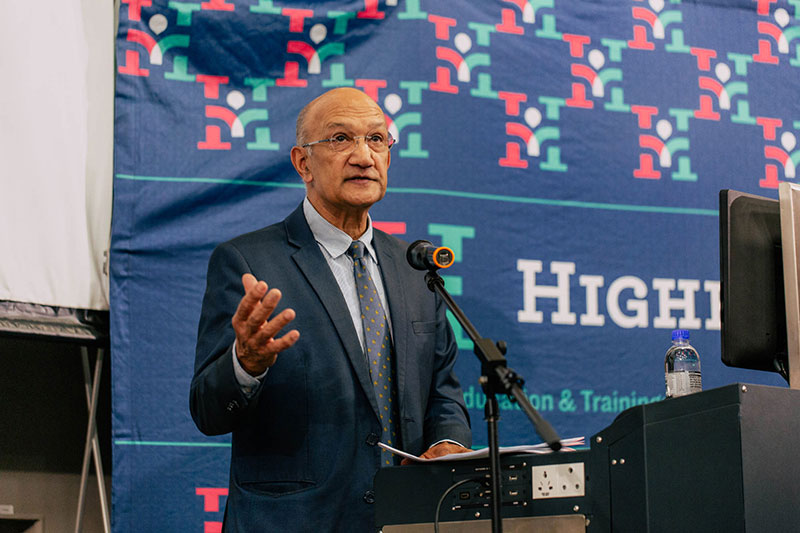Student communities can become safer as ASSIST tool launched for addiction risk
12 June 2023 | Story Kamva Somdyala. Photos Robyn Walker. Read time 5 min.
In an effort to build safer student communities, the web app Alcohol, Smoking and Substance Involvement Screening Test (ASSIST) has been launched in a bid to detect risky substance use, which contributes to social ills, including crime and gender-based violence.
The International Technology Transfer Centre South Africa (ITTC), which is based at The University of Cape Town (UCT), developed and piloted the tool in collaboration with several national government departments, including Social Development; Justice and Correctional Services; and Higher Education, Science and Technology, among others.
Student health and wellness aide group Higher Health was also represented at the launch event held at UCT’s Faculty of Health Sciences (FHS).
The ASSIST is a validated World Health Organization (WHO)-developed questionnaire that screens for substance use risk levels and provides early intervention through psychoeducation regarding potential harms and sequelae across multiple substances.
Speaking about the genesis of the ASSIST tool, UCT’s head of Division of Addiction Psychiatry, Associate Professor Goodman Sibeko, remarked: “There is currently no reliable comprehensive passive [collected through routine practice at community-level] risk map for substance use and substance use disorders in South Africa.”

Associate Professor Sibeko added: “Current indicators for the Department of Health only mandate data collection to indicate whether screening has taken place and whether some form of intervention has been provided to patients.”
As a tool developed to aid the public at large, but with special utility for the South African student population, UCT student representative Naledi Mohale hailed the pilot project as one that will strengthen the university experience, given the rise of social ills such as crime in institutions of higher learning.
“The app allows for empowered intervention.”
“The alarming stories of students who lose their lives at the hands of their peers remind us that some are perpetrators. The people involved in crime and gender-based violence have gotten closer and closer to our age.
“As a generation of doers, we often ask ourselves what we can do to curb these social ills. That is why it is important that [an up such as] ASSIST exists. The app allows for empowered intervention,” said Mohale.
“There is great power in not taking away autonomy in intervention; in allowing people to recognise and identify the need by themselves for them to change.
“In these solutions, we create a university experience for all – that is, an educational experience and one of personal growth; an experience that is not crowded by crime; an experience not marred by constant fear; an experience that is deserved by each and every student entering tertiary institutions in South Africa,” she added.
Prison population
Attendees also heard, through the Department of Correctional Services’ chief deputy commissioner responsible for incarceration and corrections, Anna Molepo, that of the 157 000* people in their facilities, 44 219 are youth, with 32 000 classified in the maximum-security category.
“The statistics show the number of youth incarceration is increasing drastically. Early detection of substance use disorder would assist youth not to commit crime linked to alcohol and substance use,” said Molepo.
“The department acknowledges the role of alcohol and drugs in the commission of crimes; hence we provide substance abuse programmes for those whose rehabilitation is dependent on its completion.”

Vice-Chancellor (Interim) Emeritus Professor Daya Reddy lauded the initiative for its multi-sectoral approach to a grave South African problem.
“We have a responsibility as researchers to communicate the results of our research, to make these results accessible and, importantly, to develop the means by which the knowledge we generate in this way can improve the quality of life – for people and communities around us,” said Emeritus Professor Reddy.
“I’d like to express my appreciation to the ministry of Justice and Correctional Services; Social Development; Health; and Higher Education and Training in the development and testing of the ASSIST app. The involvement of so many ministries emphasises the wide reach of substance abuse in South Africa and the need for a comprehensive response to fight it,” added Reddy.

According to Sibeko, some believe that the health system is not ready to receive the referrals that might result from use of the tool. In other words, people could show high-risk levels without the available resources to treat them.
“In the interim, while trying to mobilise resources, the brief interventions contained within the tool allow one to limit people’s likelihood to advance to riskier levels substance use,” he said.
He also assured people that no identifying mechanism is installed in the tool and no data trail is left.
‘Make sure you don’t land there’
Minister of Social Development Lindiwe Zulu was the keynote speaker and in an impassioned plea, urged students and young people to do all they can to avoid landing up in correctional service facilities owing to actions related to substance abuse.
“This is an important chapter because we are turning around the lives of students in institutions of higher learning. I want to say to young people, in the best way that you can, make sure you don’t land there [in a Correctional Services facility]. It’s possible to fall on the wayside; and when that happens, people tend to blame a lot of things around them,” the minister said.
“We are building safer student communities against crime, substance abuse, gender-based violence and we are using this tool being launched.”
The ASSIST tool:
- assesses recent substance use over the past three months and assesses for lifetime use risks
- contains a comprehensive list of substances including for tobacco and alcohol
- provides a level of risk for each substance
- has a second part of the intervention – the Brief Intervention (BI) – and provides direction for language and content to be used in brief intervention
- provides information and feedback about the risks and harms associated with each substance; includes physical, medical, and psychological risks of regular substance use
- refers high risk scoring to specialised treatment – usually a small proportion (5%) of the using population will be at high risk. The rest of the individuals can be treated via a BI.
* Data correct as of March 2023.
 This work is licensed under a Creative Commons Attribution-NoDerivatives 4.0 International License.
This work is licensed under a Creative Commons Attribution-NoDerivatives 4.0 International License.
Please view the republishing articles page for more information.










